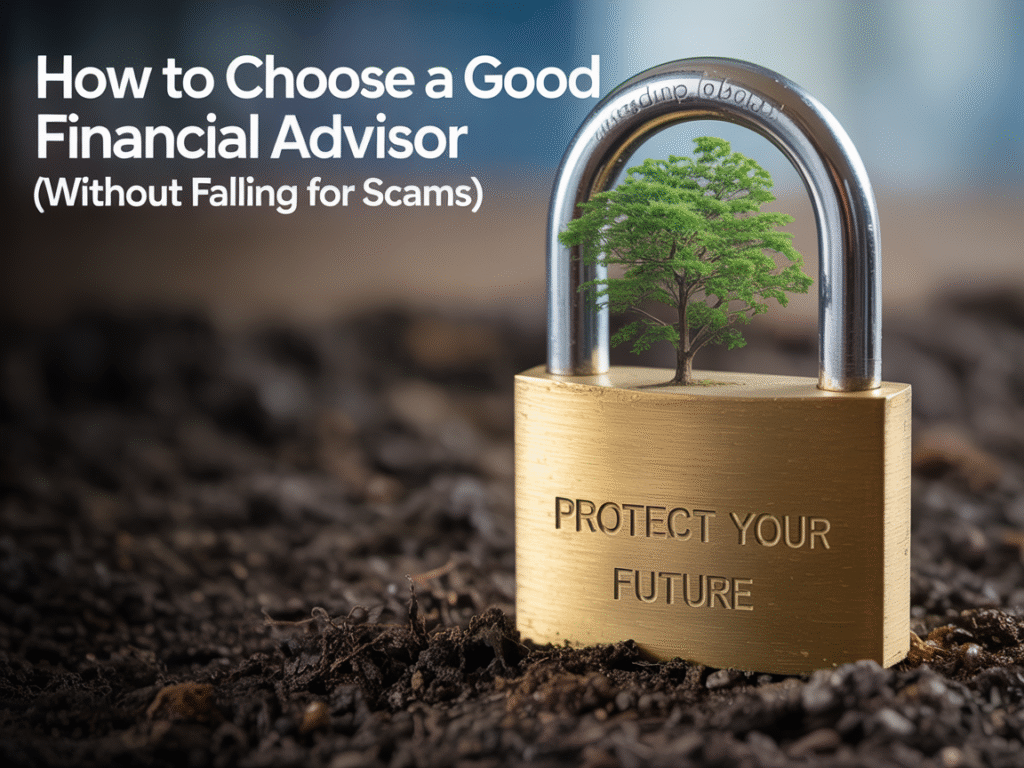
Let me be real with you — finding a trustworthy financial advisor feels like trying to find a needle in a haystack. You want someone who’s legit, knows their stuff, and won’t try to sell you some get-rich-quick scheme or charge crazy fees. But at the same time, you’re not sure what to look for or how to avoid getting scammed.
The truth is, a good financial advisor can make a huge difference in your money life — helping you get out of debt, save smarter, or plan for the future. But bad ones? Well, they can leave you worse off than when you started.
So, if you’ve ever wondered, “How the heck do I even pick a good advisor without falling into a trap?” — you’re in the right place. I’m gonna share some tips, tricks, and red flags based on real stories, so you can make a confident choice.
Why You Might Need a Financial Advisor (And Why You Might Not)
First off, not everyone needs a financial advisor. Some people can manage their money just fine by reading good books (like The Simple Path to Wealth by JL Collins) or using apps like Personal Capital or Mint.
But if your finances are a mess — maybe you’re juggling debt, saving for retirement, or planning to buy a house — an advisor could help you map it all out. My buddy Carlos was overwhelmed with his credit card debts and didn’t know where to start. After working with an advisor, he finally got a clear plan and started making progress.
How to Spot a Good Financial Advisor
1. Check Credentials — And Don’t Be Afraid to Ask
A legit advisor should have credentials like CFP® (Certified Financial Planner) or CPA (Certified Public Accountant) if they deal with taxes. These titles mean they’ve passed exams and follow ethical standards.
Don’t be shy to ask them straight up: “Hey, what certifications do you have?” If they dodge or say none, that’s a red flag.
2. Understand How They Get Paid
This is super important. Advisors can get paid in different ways — some charge a flat fee, some a percentage of your assets (usually around 1%), and others make money through commissions when you buy certain products.
Ojo con esto: Commission-based advisors might push products that make them money, but aren’t the best fit for you. I once heard about a guy, Mike, who got roped into buying expensive insurance policies that didn’t help him at all — just because his advisor earned a fat commission.
Look for “fee-only” advisors if you want unbiased advice — they get paid directly by you, no sneaky commissions.
3. Ask for References and Read Reviews
No, don’t just take their word for it. Ask if you can talk to current or past clients. If they say no or seem uncomfortable, be cautious.
Also, check online reviews and see if the advisor is registered with the SEC (Securities and Exchange Commission) or FINRA (Financial Industry Regulatory Authority) in the U.S. You can use the BrokerCheck tool by FINRA to look up their history and any complaints.
Red Flags That Should Make You Run
- Pressure to Invest Quickly: If they’re pushing you to make snap decisions or invest in something “hot,” slow down. Real advisors want you to understand and feel comfortable before making moves.
- Promises of High Returns With No Risk: Sorry, but no one can guarantee 20% returns without risk. Anyone claiming that is probably trying to scam you.
- Lack of Transparency: If they won’t clearly explain fees, investment strategies, or your options, that’s a big no-no.
- Overly Complicated Jargon: Good advisors explain things simply. If you leave a meeting more confused, it might be a warning sign.
Questions to Ask Before Signing Anything
Here are some questions you can ask your potential advisor:
- How will you tailor your advice to my personal goals?
- What’s your investment philosophy?
- How often will we review my plan?
- Can I see a sample financial plan?
- How do you handle conflicts of interest?
- What happens if I want to stop working with you?
The answers should feel clear and honest, not vague or pushy.

Practical Tips: Protect Yourself
- Start Small: Don’t dump all your money with an advisor right away. Try a short-term consultation or work with them on a smaller part of your finances first.
- Get a Second Opinion: If something feels off, ask another advisor or a trusted friend who knows about money.
- Use Technology: Apps like Personal Capital can help you track your investments and make sure your advisor’s advice matches what’s actually happening.
- Educate Yourself: The more you know about personal finance, the harder it is to get duped. Books, podcasts like The Dave Ramsey Show or ChooseFI, and websites like Investopedia are good places to start.
Real-Life Example: Sarah’s Story
Sarah was overwhelmed managing her student loans and saving for a home. She found an advisor online who promised fast results. At first, it sounded great, but she quickly realized the advisor was more focused on selling her investment products than helping her budget or tackle debt.
After switching to a fee-only advisor recommended by a friend, Sarah finally got a clear, honest plan — no pressure, just practical steps. Now she’s on track to own a home in a few years.
Final Thoughts: You Can Find a Good Advisor — Just Be Smart About It
No one wants to get scammed or waste money on bad advice, and honestly, that fear can keep you from even trying. But the right financial advisor can be like having a personal coach for your money — guiding you, encouraging you, and keeping you accountable.
The key is to take your time, ask the right questions, and trust your gut. Remember, it’s your money, and you get to decide who helps you with it.
So, if you’re feeling lost or overwhelmed, don’t be afraid to reach out — just make sure you’re dealing with someone who has your best interests at heart.
